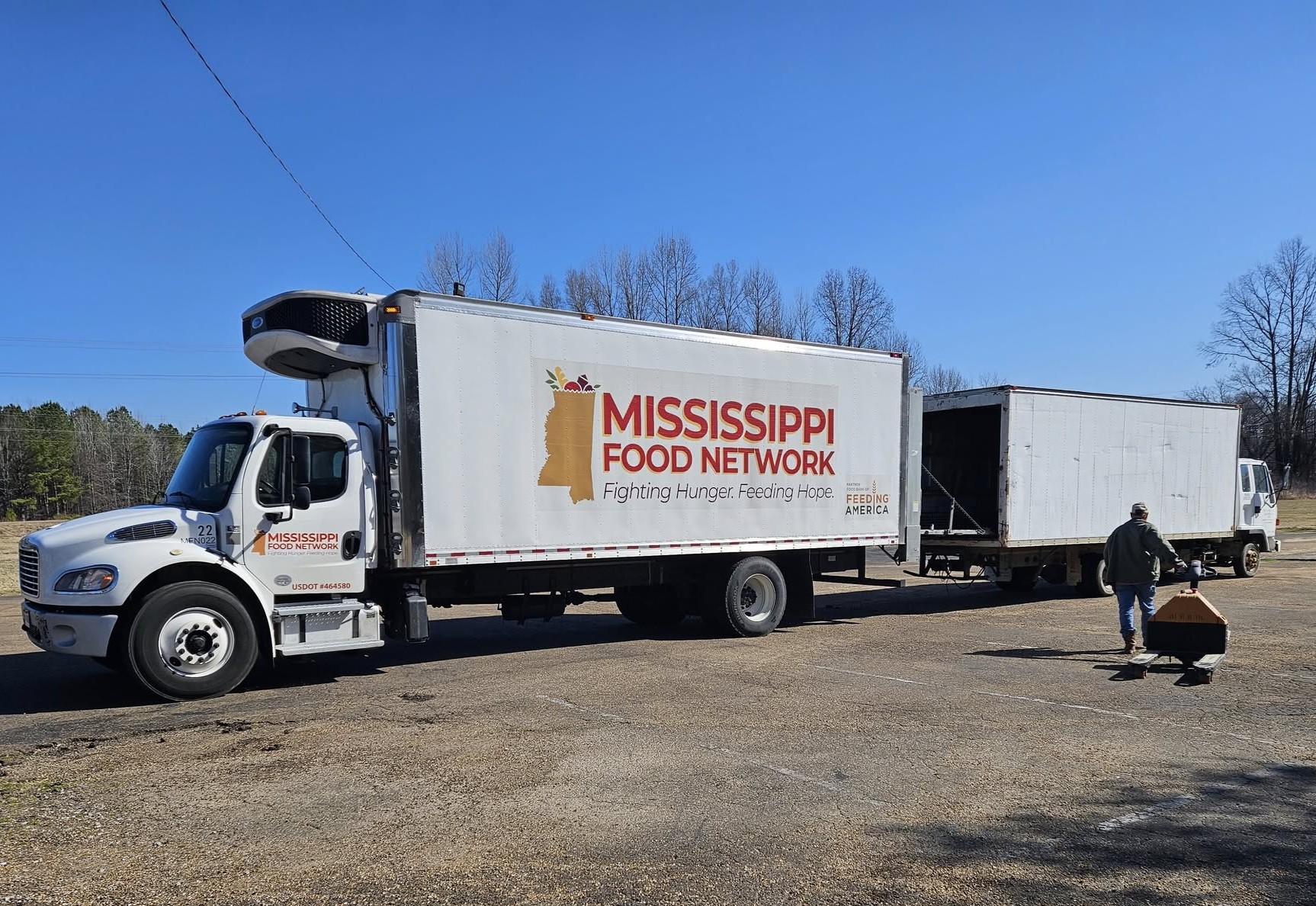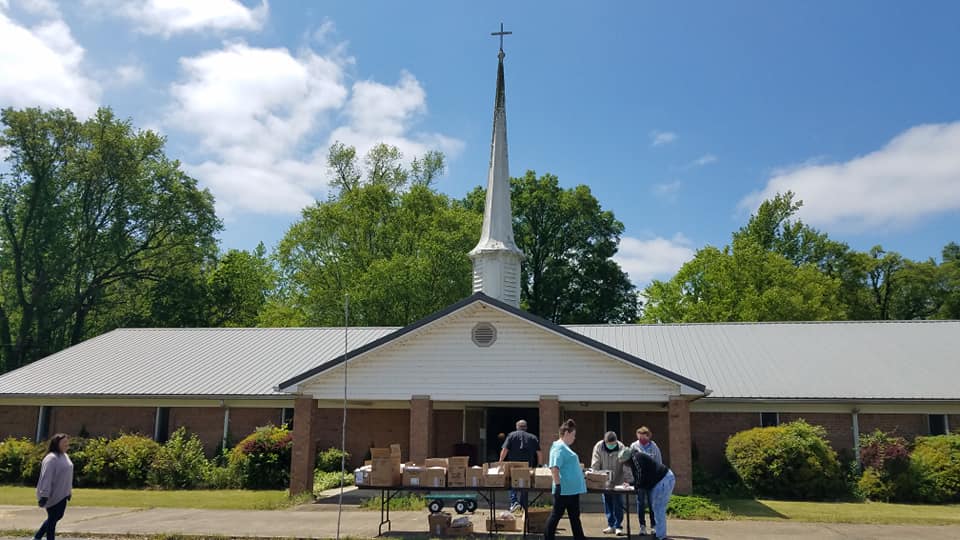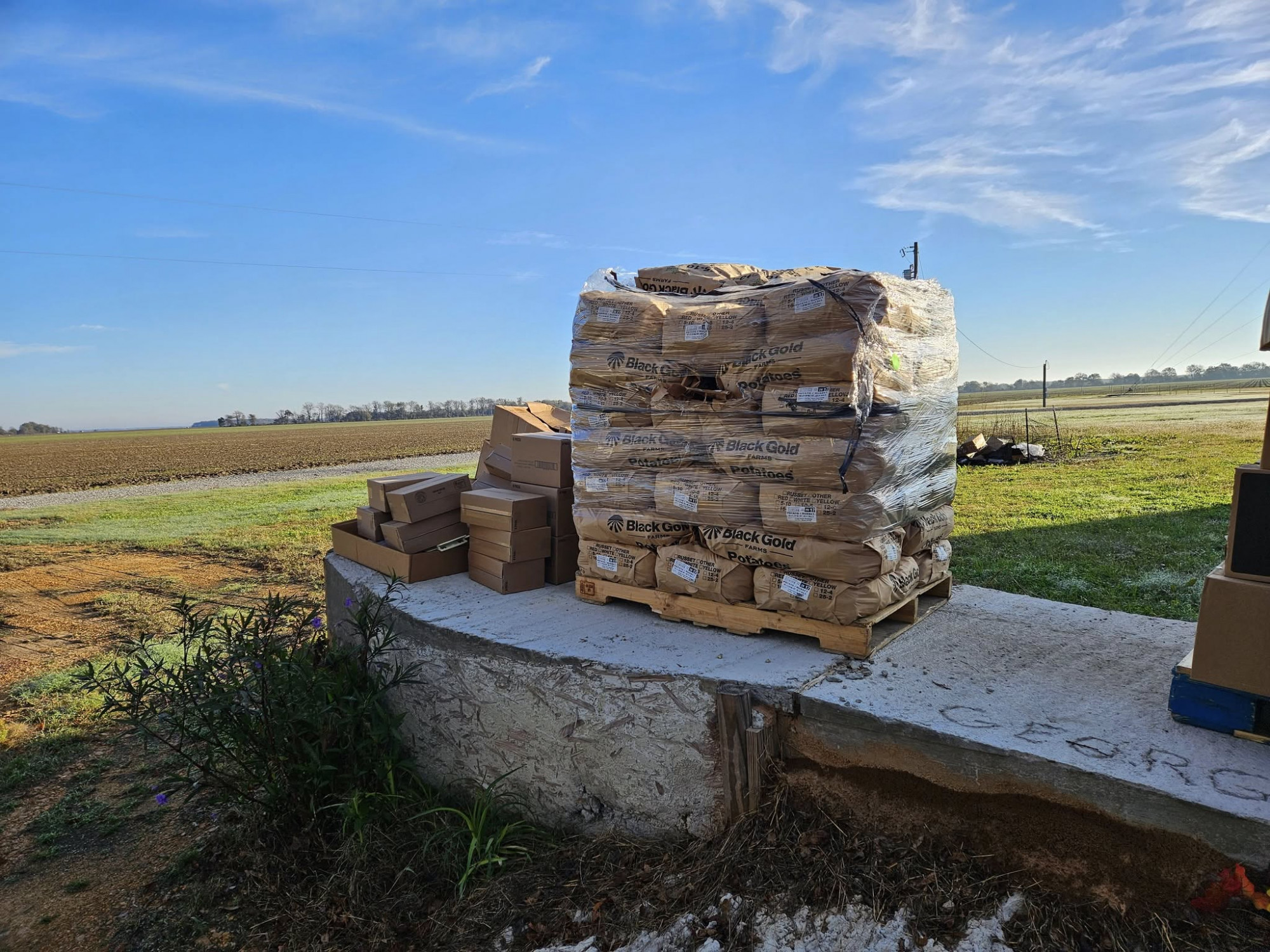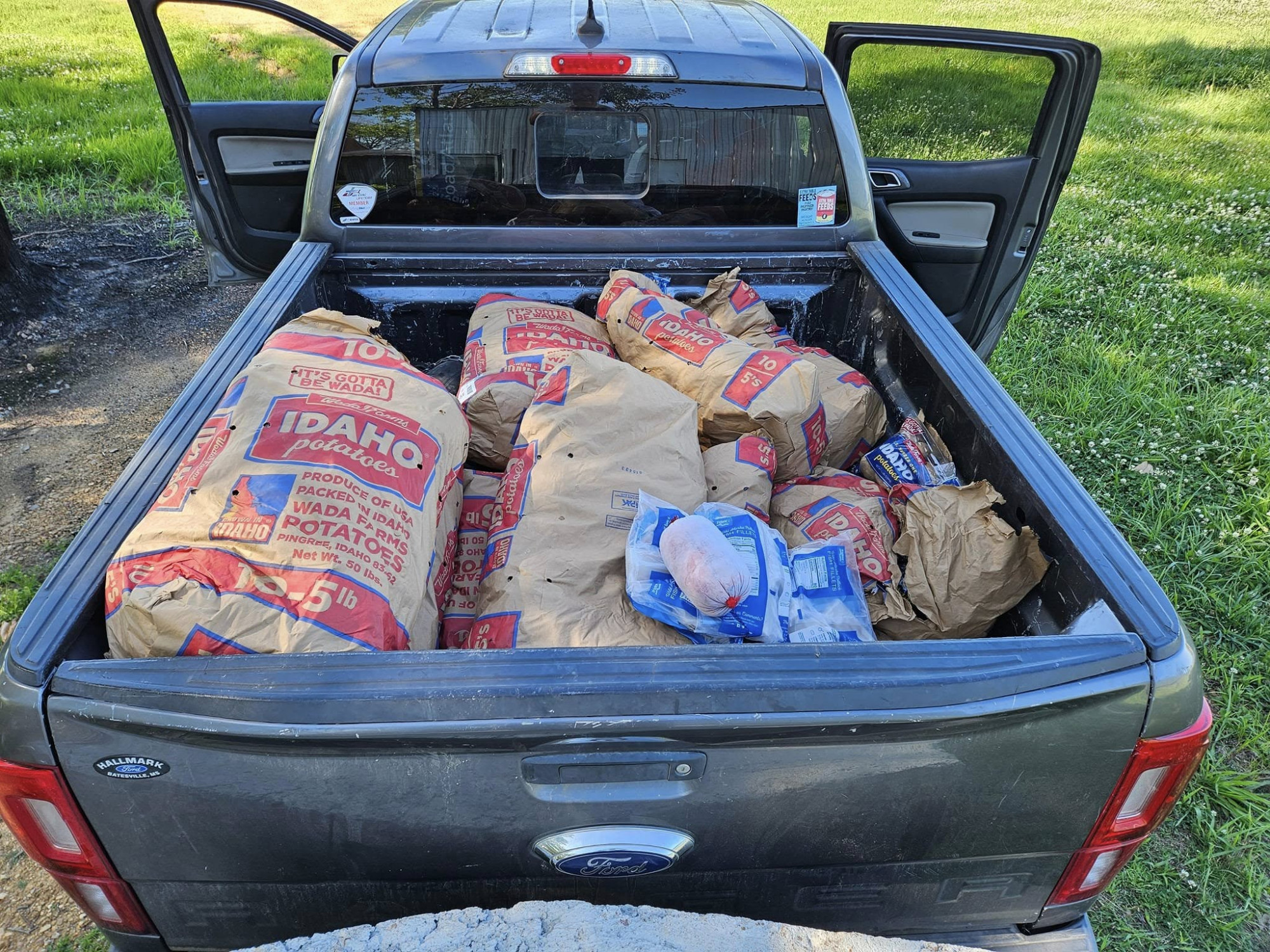Dispatch from a Delta Food Network
How an interdenominational charity is tackling food insecurity in western Mississippi
By Eugene Stockstill

The Robert Neal Food Pantry Network partners with the Jackson-based Mississippi Food Network to distribute groceries to food-insecure communities throughout the Delta region. Photograph courtesy of the Rev. Joe Young.
I lit out one rainy spring morning in late May to confirm what I had already been persuaded was factual: The Robert Neal Food Pantry Network is a small but vital oasis in a sprawling food desert. The non-profit organization provides monthly food for six hundred or more families in Coahoma, Sunflower, and Tallahatchie counties, part of the poorest part of my poor state of Mississippi.
It was closer to 2,400 families a month during the COVID pandemic, said the Rev. Joe Young, a white-haired, soft-spoken Southern Baptist preacher and my guide for the day into food insecurity in the Mississippi Delta.
“In some cases, there are no grocery stores or supermarkets in entire cities,” said Young, pastor of Calvary Chapel in the area of Parchman, Mississippi. “It is not uncommon to find elderly widows paying a drug addict twenty dollars to drive them [somewhere] for shopping,” only to discover that their ride has abandoned them at the store with no way home.
When I left on my excursion, I had a good hunch about what I would find. I’m involved in a food pantry in Myrtle, Mississippi, a small town in the foothills of Appalachia that’s known around the country thanks to the glory days of the nation’s railroads. Our queues in Myrtle each month include pastors, minimum-wagers, community college kids, war veterans, families of eight, and sweet little silver-haired grandmas trying to stretch a Social Security check through the whole month.
I’d taken the time to nail down a few stats, too. On the website for the University of Mississippi’s Community First Research Center for Wellbeing and Creative Achievement (CREW), which researches food scarcity and funds a variety of programs to fight hunger, I found a map pinpointing the ten most food-insecure counties in the state. Seven of them are in the Delta, where the gap between the haves and have-nots yawns wider than in other parts of Mississippi.
Food scarcity “means not being able to make it to the end of the month without running out of groceries,” said Dr. Meagen Rosenthal, a pharmacy professor at Ole Miss and the director of CREW. The center estimates that at least sixteen percent of the state’s population is food insecure.

Volunteers work to set up the distribution center for the Faith Food Pantry outside of Faith Baptist Church in Charleston, Mississippi, where cars line the side of Highway 32 to receive aid. Photograph courtesy of the Rev. Joe Young.
Before I left, I should have double-checked data from Google that informed me the network’s first food distribution would be happening between 8:00 and 10:00 a.m. that Saturday in May. In fact, the distribution at Calvary Chapel in Sunflower County is from 7:30 to 9:30 a.m. each third Saturday. (And in case you ever visit, the church is located in Tutwiler, Mississippi, not in Drew, as Google Maps would have you believe.)
Calvary sits less than a mile from the controversial state penitentiary at Parchman. I arrived during a torrential rainstorm, and not a soul was to be found at the metal pantry building behind the church. American, Christian, and Mexican national flags were flying out front to mark a decades-old partnership with churches in the Mexican state of Tamaulipas. Young speaks fluent Spanish and is a walking encyclopedia of Delta history.
That left me with nothing to do but to head back toward Charleston while I took in the scrubbed, forlorn beauty of the area. Creeping combines that resemble giant insects. Ramshackle houses. Abandoned stores. Communities with exotic-sounding names like Macel and Brazil. Huge tracts of private land. A bright yellow crop-duster buzzing overhead. A sign for take-out-only Chinese chicken.
When I finally arrived at Faith Baptist Church, about an hour later, I discovered a string of at least thirty cars lining the side of Highway 32 in Charleston. Young showed up a few minutes later and told me that the Parchman and Charleston distributions each help at least two hundred families a month.
On this particular Saturday, about a dozen volunteers had gathered at Faith, a ranch-style red brick building with a weathered white steeple. An Alcoholics Anonymous group meets there weekly, too. Several food network volunteers are from the Charleston Recovery Center, a rehab located about a block away.
“I delivered to six old people this morning,” said Young, during his morning pep talk before the doors officially opened at 11:00 a.m., even though the basic policy is to not deliver from door to door. “I appreciate y’all.”
The seasoned preacher then turned and asked me—I happen to be a UMC minister, too— to open the morning’s work with prayer. “Sometimes the needs seem overwhelming,” I prayed. “Thank you for the chance to make a difference where we are.”
There was an energetic yet bittersweet air in the place that morning, as if those helping understood at a deep level the enormity of the needs in relation to the resources available. A sheriff’s deputy directed traffic off the highway, and volunteers escorted vehicles to the back of the church, where orders were filled as rain sprinkled down.
“I enjoy helping out,” said Audrey Crocker, fifteen, who has worked with the group for a couple of years and who almost leaped into one of the cars in line to give an old, happy-looking woman a hug. “I think it’s a good idea for kids to come out and help the community.”

Bags of rice at Calvary Chapel in Parchman, Mississippi. On this day, volunteers distributed food to help 305 people from 130 families. Photograph courtesy of the Rev. Joe Young.

A truck filled with potatoes is dropped off at Calvary Chapel in Parchman, Mississippi, for the Robert Neal Food Pantry Network. Photograph courtesy of the Rev. Joe Young.
Mid-South Food Bank, in Memphis, had to shut down all of its forty-plus mobile food pantries in Mississippi, Tennessee, and Arkansas due to federal budget cuts.
Early the following week, Young and perhaps others would take a van or truck filled with food to Glendora, the Tallahatchie County village famous as the birthplace of Sonny Boy Williamson, “The King of the Harmonica.” There, food goes directly from a pantry vehicle into the cars of between fifty and seventy-five families. The network also sends food each month to churches in Leland, Isola, Greenwood, and Cleveland.
“It’s a good thing they’re doing because they’re feeding a lot of needy people,” said Julie Thomas, a lifelong Glendora resident and the great-niece of Williamson, who is among the recipients of the network’s monthly distributions. She cited inflation and unemployment as the most pressing concerns of her community.
Such beneficence is repeated anonymously week after week at food pantries, soup kitchens, and other eleemosynary organizations nationwide. More than fifty million people in the United States get regular help from food charities, according to Feeding America, and with recent cuts to federal food programs, the situation for the elderly, the unemployed, and the underemployed is looking more dire by the day.
Earlier this year, for example, Mid-South Food Bank, in Memphis, had to shut down all of its forty-plus mobile food pantries in Mississippi, Tennessee, and Arkansas due to federal budget cuts. Other services remain open in Mid-South’s network, which includes more than 400,000 households in thirty-one counties.
Ronsenthal said a huge gap exists between perception and reality, when it comes to hunger. “The biggest misconception I have seen is that we think we know what people look like who have food scarcity,” she said. “Unfortunately, what our work has shown us is that the population looks much different.”
Some years ago, Young’s congregation at Calvary Chapel surveyed community needs and came up with hunger as a pressing concern. At the start, they had a few groceries tucked into one corner of the church’s fellowship hall. State employees and teachers were among the neediest. The church solicited no funds and was collecting donations from individuals when a Sunflower County canning company started to send huge quantities of vegetables on a regular basis.
After Hurricane Katrina, which brought an influx of temporary migrants, the small pantry connected with the Mississippi Food Network in Jackson, which is a part of the national program Feeding America. Later, with the addition of the pantry at Faith, Young said, a regional food network was born.
From the beginning, Young said, the idea was to help anyone who needed help. “We try to make sure nobody goes to bed hungry.” Local schools and churches from a variety of denominations have assisted the Robert Neal Food Pantry Network, as have the Northwest Mississippi Community Foundation, Extra Table in Hattiesburg, and Modern Workmen of America. The network now has two fully refrigerated and stocked warehouses with loading docks and pallet jacks.
Young said that the network’s goals extend beyond promoting food security in the short term. “[We] help the economy of small, poverty-stricken towns,” he said. “Factories are reluctant to locate in poor communities. Factories sometimes have to shut down for a week or a few weeks, and if there is no such food program for their families to fall back on in such times, they are likely to leave the area and the small factory or business has to close its doors.”
And yet, the immediate impact of the work is evident on distribution days. Sonny Hayes is seventy years old and a lifelong resident of Glendora. He said the difference the network’s distributions make is incalculable. “Our town really needs their help,” Hayes said. “It would be kind of tough on me and the community” without it.
Support the Oxford American
The Whiting Foundation will double your donation—up to $20,000.

Your donation helps us publish more work like the article you're reading right now. And for a limited time, every gift will be matched up to $20,000 by the Whiting Foundation.
Prefer a subscription? You'll receive our award-winning print magazine—though subscriptions aren’t eligible for the match.



